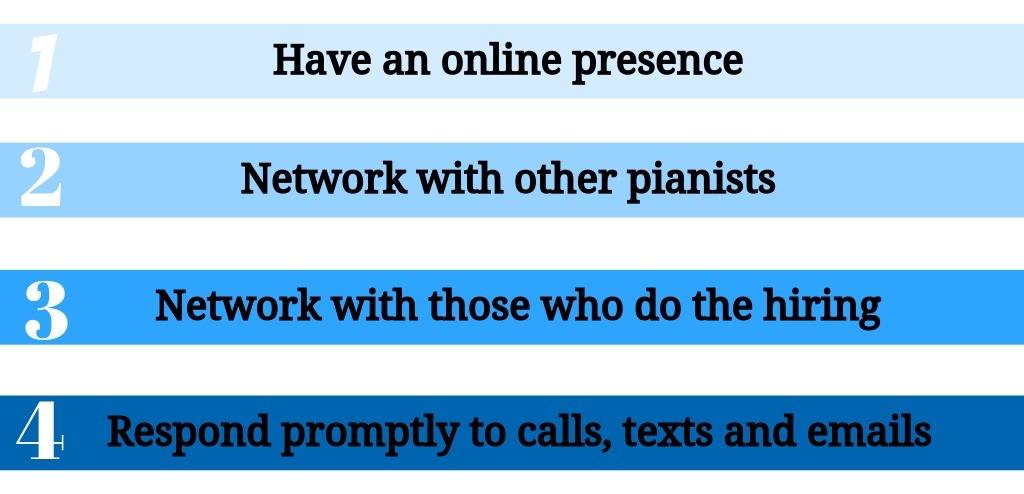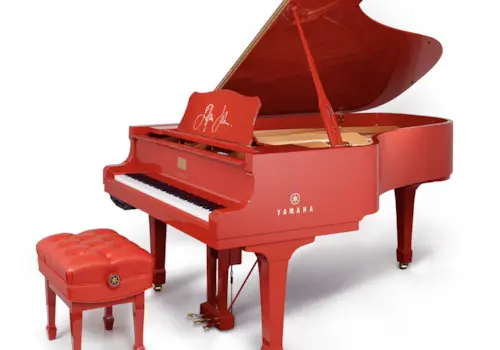Rhonda Rizzo shares 7 pieces advice on how to make sure you get paid for your services
“We can’t afford you!”
“It’s for a good cause!”
“But you love to play the piano!”
“It’s great exposure for you!”
When I was establishing myself as a pianist, I fell for all of these excuses. That changed one evening when, after playing background music for several hours, I saw another entertainer receive a check and I was given a “thank you” flower arrangement. That’s when I knew I had to get tougher about getting paid.
Like most pianists, I was taught quite a bit about how to play a beautiful phrase, but next to nothing about how to make my way as a professional in the music industry. I dreamed of having an agent to find me work but soon learned that all pianists (even those lucky ones with agents) must advocate for ourselves. In other words, if I wanted to be a professional pianist, I had to “get my hands dirty” with the practical tasks of marketing and sales. I had to learn how to think like a business person and how to present myself that way to other people.
The music marketplace changes quickly, but here are some timeless guidelines I learned about getting paid to play:
1. Be an accomplished performer

Before you start marketing yourself, make sure you’re capable of playing at a professional level. If you’re looking to play background music, compile and perfect several “set” lists. If you’re looking to collaborate with other musicians, be sure that you’re a strong sight-reader. If you hope to accompany a choir, become adept at reading open score. In other words, learn as much as you can about the requirements of a job before you try to get the job.
2. Know what others charge

Every community has a “going rate” for nearly every type of gig. Knowing your numbers lets you feel comfortable setting an appropriate fee. Check online sites, professional organisations, and other pianists for this information. Once you know the rates most others charge you can decide for yourself how much you need to get paid to make the job worth your time.
3. Market yourself

No matter how great a pianist you are, no one will hire you if they don’t know who you are or how to reach you. Succeeding at this means committing to several things:

4. Be clear about terms

How many hours will you be playing? If it’s a wedding or a collaborative job will you be paid for rehearsal time? When do you get paid? In what form will you be paid? These are all things you need to work out before you accept a gig. It’s best to put this information into a simple written contract. Check online for some basic performance contract templates and use these to create your own.
5. Specialise

The busiest paid pianists I know are the ones who have created a niche for themselves. Weddings, collaborative jobs, restaurant work, musical theatre opportunities, etc. Almost all of these jobs go to pianists who have learned the repertoire of their chosen focus. Once you gain footing in one area, it’s easier to pick up other work.
Start building up your repertoire by selecting some sheet music from our store.
6. Be professional. Always.

Never show up late for a job. Always arrive prepared. Be courteous, friendly, and cooperative. Be sober (seems obvious, but I once hired a bass player who showed up drunk. I never hired him again). Be appropriately dressed. Say thank you. Never gossip about presenters or other players.
7. Know when to walk away

Some gigs just aren’t worth the time and aggravation. For example, I loathe pounding out vocal parts and so I don’t accept choir accompanying jobs. Another musician I know instigated three prices for playing weddings: a low rate if he picks the music, a middle rate if the bride picks the music, and a high rate if the mother of the bride picks the music. The question I learned to ask myself is, how much do I need to be paid for this work in order to not resent doing it?
Ultimately, getting paid to play the piano rests in our hands. By choosing to promote ourselves and to work in a business-like manner we can play for both love AND money.
Why not brush up on your piano skills for FREE with our sample issue? Give us a go. We won't disappoint.







